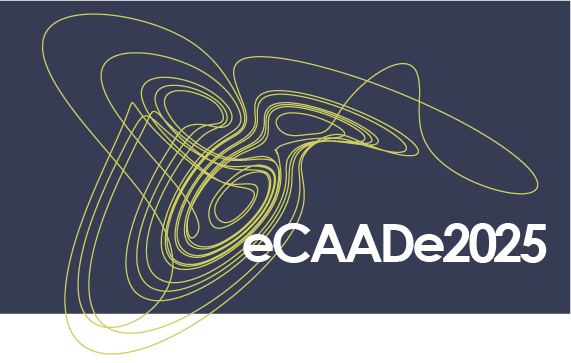Pre-conference Workshops
The 43rd eCAADe Conference in Ankara, Türkiye, will host a series of pre-conference workshops on September 1–2, 2025. These workshops provide an intense teaching and learning environment, offering participants opportunities to explore specialized topics, engage in hands-on experiences, and take part in insightful discussions in small groups.
Led by researchers, professionals, and practitioners in architectural and design computing, the workshops will cover a range of emerging issues and practical applications, including AI, machine learning, AR/VR, generative design, bio-inspired computation, analysis and simulation, optimization, smart data applications, and human–machine collaboration.
Below, you will find posters, detailed descriptions, and registration links for each workshop. We warmly invite you to review the sessions and register for the ones that best match your interests.
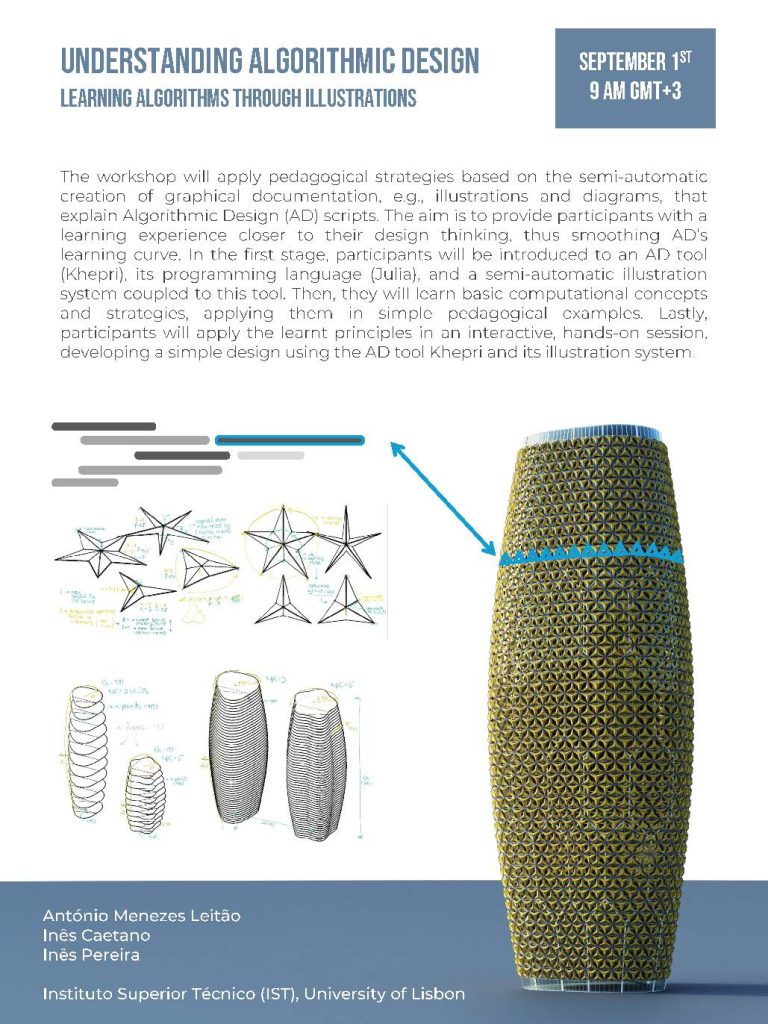
Understanding Algorithmic Design: Learning Algorithms through Illustrations
The workshop will employ pedagogical strategies based on the semi-automatic creation of graphical documentation, such as illustrations and diagrams, to explain Algorithmic Design (AD) scripts. The aim is to provide participants with a learning experience that aligns more closely with their design thinking, thereby smoothing AD’s learning curve.
In this workshop, participants will explore the basic principles of AD with the support of an automatic illustration system that creates digital annotated schemas describing algorithms. The workshop targets architects, designers, and engineers (or professionals from related fields) interested in AD and is divided into 4 main sessions:
- Introductory session covering the workshop context, goals, expected outcomes, and tools, namely Khepri (an AD tool based on the Julia programming language), the automatic illustrator, Visual Studio Code (a programming editor), and Jupyter (a computational notebook for integrating code, text, and drawings).
- Theoretical session on AD’s fundamental principles, basic programming strategies, and provision of relevant functions for the hands-on activities.
- Practical session where participants will apply the learned principles in simple designs by using Khepri and its illustrator, intertwining the produced code and generated illustrations in Jupyter notebooks.
4. Closing session where participants will be invited to respond to a brief questionnaire on the workshop’s value, limitations, and potential areas for further exploration.
By the end of the workshop, participants are expected to understand the fundamentals of AD and apply good programming practices supported by visual documentation, namely, annotated illustrations and step-by-step explanations of structured AD descriptions.
Monday | 01.09.2025 – Full Day Session – Venue 1
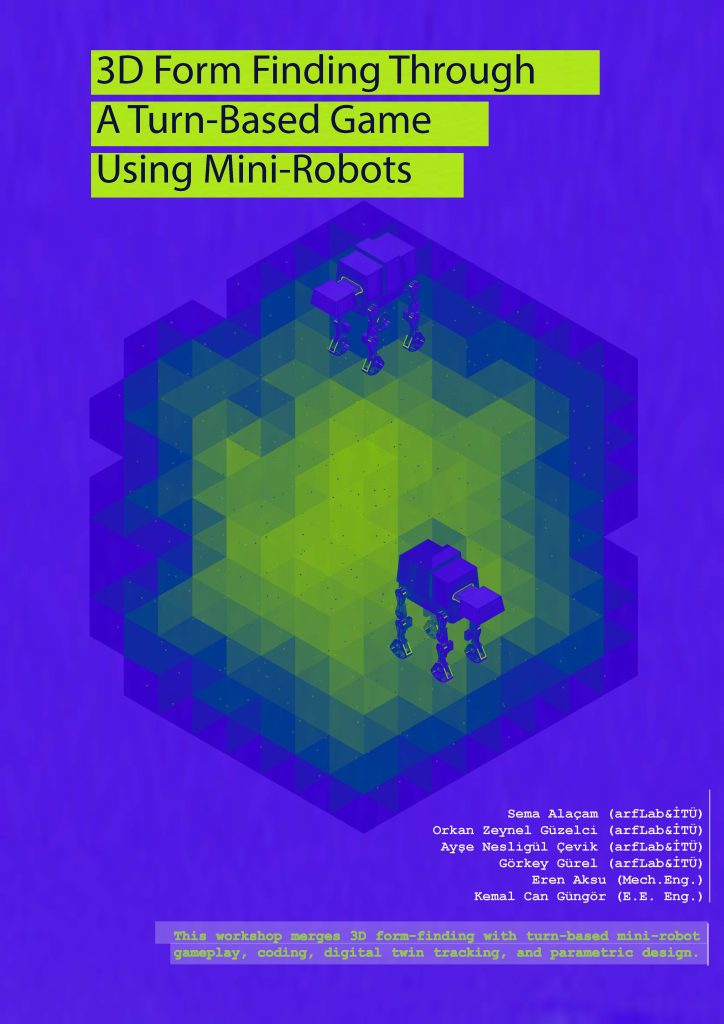
3D Form Finding Through A Turn-Based Game Using Mini-Robots
This workshop explores a novel approach to 3D form-finding through a physical turn-based game involving programmable mini-robots. While turn-based mechanics are often associated with digital environments, this workshop applies them to a spatial, real-world context in which participants define movement rules and translate them into Python code. These rules are implemented as a 2D matrix and executed by mini-robots navigating a shared physical field. Participants, working in pairs, take alternating turns in a structured game. Each move is tracked in real time by an overhead camera and recorded into a digital twin environment that mirrors the physical gameplay. The resulting sequence of turns becomes the basis for a generative design experiment.
In the second phase, participants use Rhino and Grasshopper to convert the turn-based spatial data into voxel-like 3D geometries. Through Python scripting, they implement cellular automata logic to explore how simple iterative rules can produce complex, emergent forms. Bridging robotics, code-based design, and game-based interaction, this workshop offers a playful yet rigorous workflow. Participants will gain hands-on experience in computational thinking, robotic coordination, and spatial modeling—moving fluidly from analog rules to digital form-making.
Monday | 01.09.2025 – Full Day Session – Venue 2
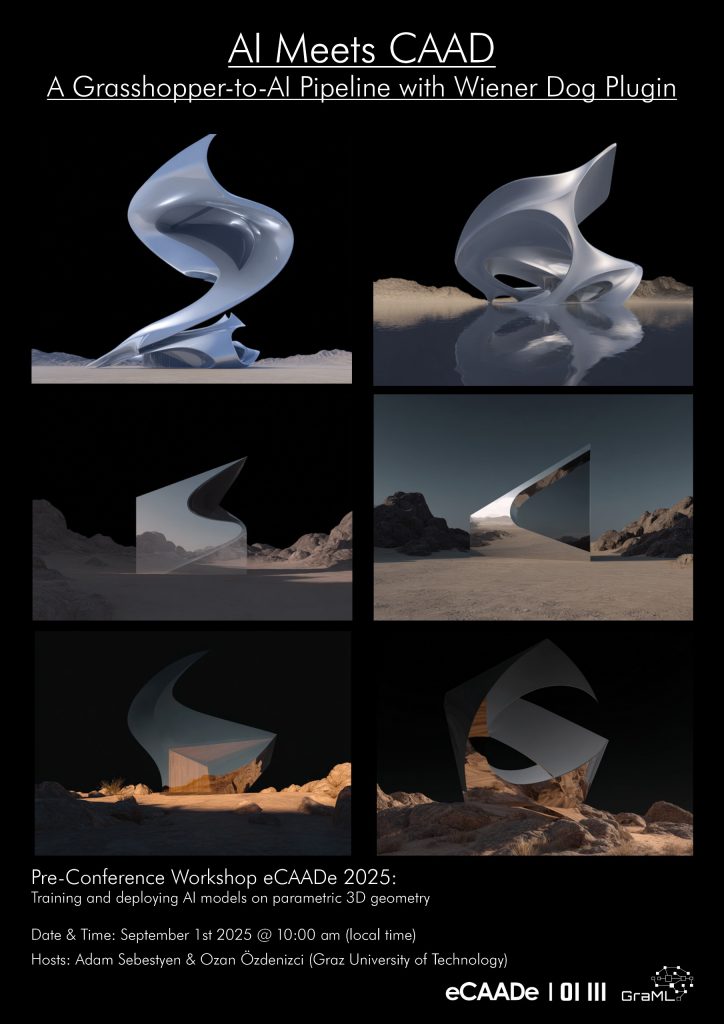
AI Meets CAAD: A Grasshopper-to-AI Pipeline with Wiener Dog Plugin
Generative AI offers powerful new possibilities for 3D design in architecture, yet one of the biggest barriers remains the lack of high-quality datasets—particularly for CAD/NURBS geometry, which forms the backbone of many architectural workflows.
Developed at the Institute of Architecture and Media in collaboration with the Institute of Machine Learning and Neural Computation at Graz University of Technology, Wiener Dog is a new Grasshopper plugin that solves this problem. It enables architects to create and export their own NURBS-based 3D datasets directly from Grasshopper in a format ready for AI training. Besides NURBS data Wiener Dog can also convert 3D geometry to voxels and point clouds and export them as a format suitable for 3D AI training.
In this hands-on workshop, participants will explore Wiener Dog, learning how to generate large, diverse, and well-structured 3D datasets directly from their parametric models. The plugin’s streamlined process makes dataset creation fast and efficient. No coding experience is needed, though basic familiarity with Grasshopper is recommended.
The session will conclude with a guided introduction to training a lightweight generative 3D AI model using the datasets participants create. Thanks to the efficient data structure provided by Wiener Dog, the training process is quick, allowing time for experimentation with different AI parameters. Participants will see how their own datasets can be used to generate new NURBS, Voxels or Point Cloud geometry, which can then be re-imported into Rhino and Grasshopper for refinement and integration into their design projects.
Software requirements:
- Rhino 8 for Windows or Mac OS
- A Google Colab and Google Drive Account
Monday | 01.09.2025 – Full Day Session – Venue 3
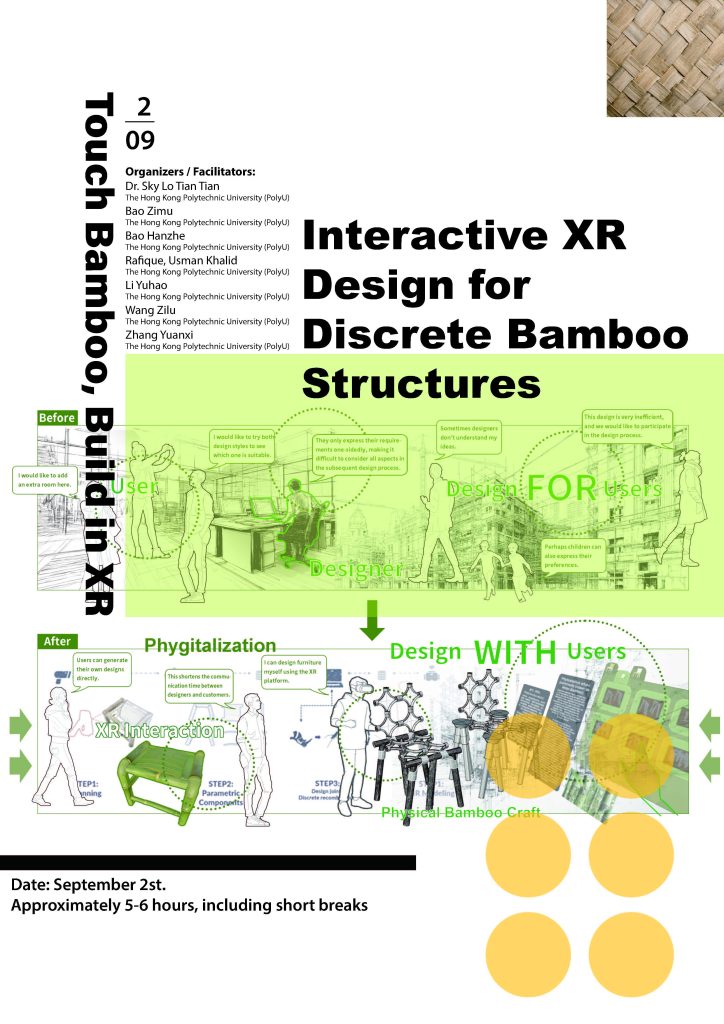
Interactive XR Design for Discrete Bamboo Structures
This workshop offers participants an immersive and interactive experience of bamboo chair construction, blending traditional craft techniques with cutting-edge XR-based visualisation. Using pre-built digital models alongside real bamboo components, the session will demonstrate how chair structures can be assembled with tools such as hammers, ropes, and simple joinery methods, highlighting the unique challenges and possibilities of working with irregular natural materials. Participants will then explore alternative arrangements and placements of these chairs in a full-scale XR environment, gaining an appreciation for how virtual prototyping can enhance and complement physical craftsmanship. A demonstration of Wasp’s digital assembly process will further showcase how modular algorithms can be applied to generate design variations and support rapid prototyping workflows.
The session introduces the system’s complete workflow—from the initial scanning of bamboo elements into point cloud data, through simplified processing in Rhino, to parametric joint strategies in Grasshopper. These steps are presented to provide clear context on how physical materials can be translated into digital form and prepared for computational design. Alongside the virtual environment, a physical workstation will showcase different species of bamboo, allowing participants to interact with the samples and instantly view their corresponding material information in the XR system. This connection between tangible samples and digital data reinforces the role of immersive technologies in linking real-world craftsmanship with virtual modelling.
Throughout the workshop, participants will take part in the virtual assembly of bamboo chairs within XR, experimenting with layouts, arrangements, and spatial contexts in real time. By engaging with both the physical workstation and the virtual prototyping tools, they will experience a seamless integration of traditional material knowledge and advanced digital workflows. This combined approach offers valuable insight into creating efficient, adaptable, and context-aware designs that respect the unique characteristics of natural materials while leveraging the flexibility of computational methods.
Tuesday | 02.09.2025 – Sull Day Session – Venue 1
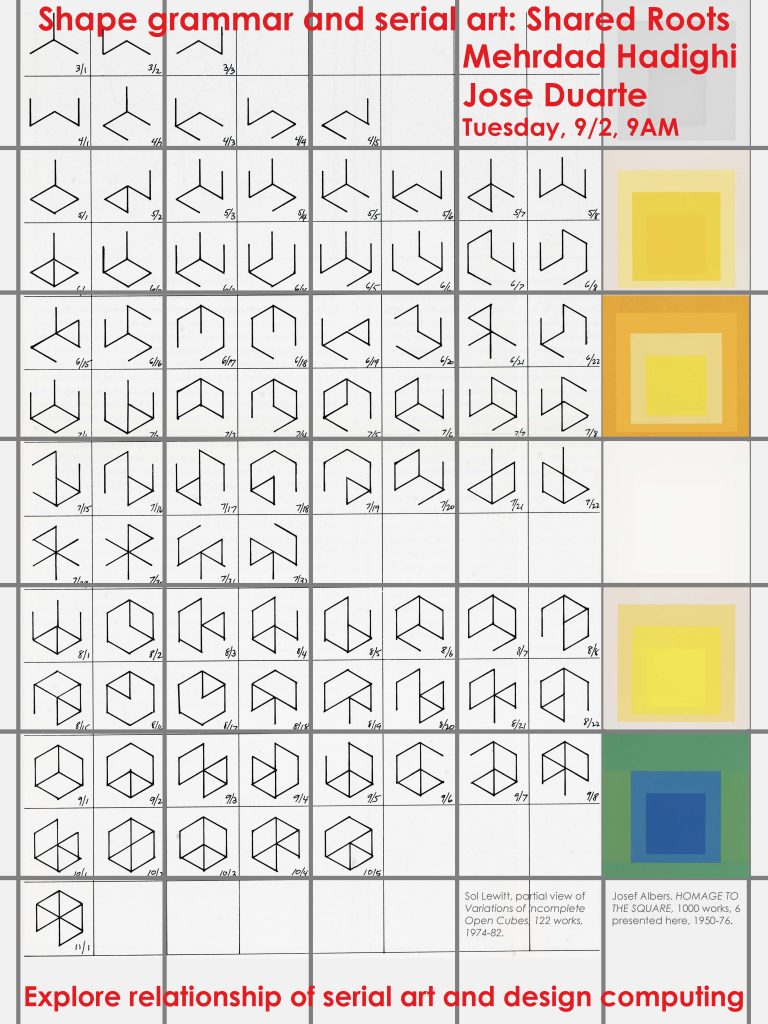
Shape grammar and serial art: Shared Roots
This workshop explores the deep historical and conceptual connections between serial works of art and the emergence of computational design in architecture. While much of today’s computational design discourse emphasizes technical development, this workshop seeks to revisit and foreground the foundational relationship between art and computation—an inquiry that defined the origins of the computational shape grammar field.
We begin with Claude Monet’s transformative serial paintings of “Haystacks” and “Rouen Cathedral” (1890–1893), which not only reshaped the language of modern art but also prefigured the serial logics later adopted by artists such as Mondrian, Albers, Warhol, and Schoenberg. These works inspired a trajectory of structured variation that leads to and runs in parallel with developments in computational design, particularly the rise of shape grammars and data-driven design in the 1960s.
This workshop, in addition to being a skills-building session, is a platform for presentation and critical discussion, inviting contributions that examine the intersection of serial art and computational design. Participants will be presented with the foundations of serial art and shape grammar, and will engage in exercises toward a collective reflection on how these twin histories inform one another and what they reveal about the generative possibilities of seriality in contemporary practice.
Tuesday | 02.09.2025 – Full Day Session – Venue 2 (Online)
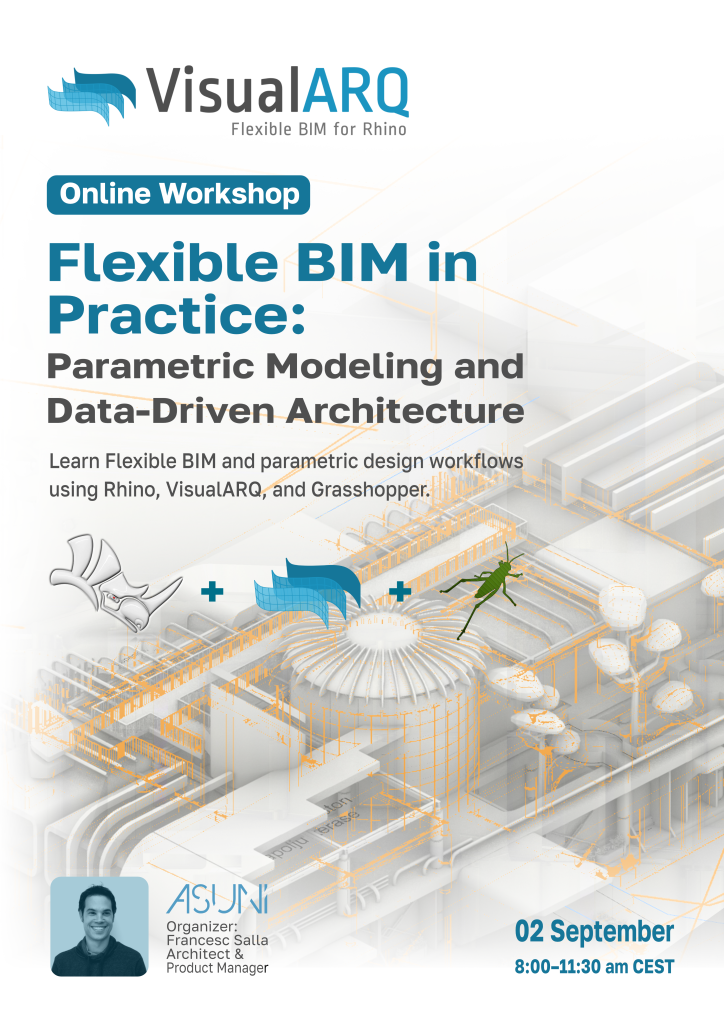
Flexible BIM in Practice: Parametric Modeling and Data-Driven Architecture
This workshop introduces participants to Flexible BIM and parametric design workflows using Rhino, VisualARQ, and Grasshopper—tools that allow for a more adaptable, design-oriented approach to Building Information Modeling. Aimed at architects, students, engineers, and designers, the session will focus on creating and documenting a customizable architectural project using intelligent parametric BIM objects.
Participants will learn how to automate modeling tasks with VisualARQ components in Grasshopper, enabling faster iterations and smarter design decisions throughout the workflow. Key themes include data-driven modeling, customizable object creation, and dynamic project documentation.
In addition to mastering flexible design strategies, attendees will explore techniques for project data management and collaboration. The workshop will also demonstrate interoperability workflows using the IFC file format and Rhino.Inside.Revit for seamless data exchange with other BIM platforms. By the end of the workshop, participants will understand how to integrate parametric thinking with BIM processes, gaining both creative freedom and technical precision in their architectural projects.
Tuesday | 02.09.2025 – Morning Session- Venue 3 (Online)
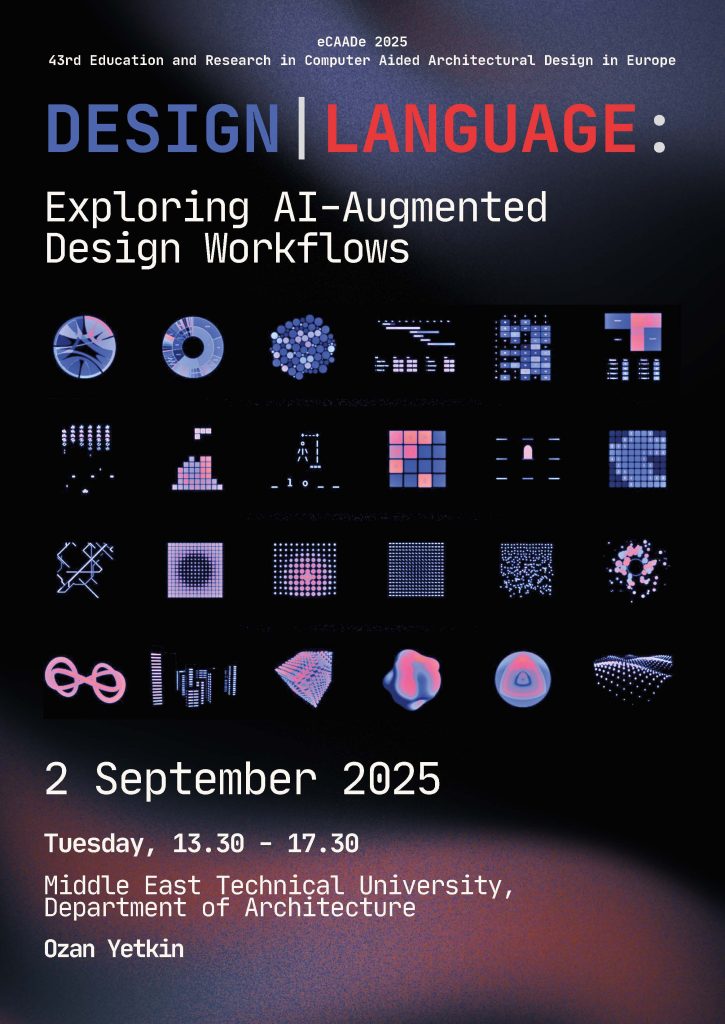
Design x Language: Exploring AI-Augmented Design Workflows
This workshop introduces participants to the creative integration of Large Language Models (LLMs) into computational design workflows. With the increasing accessibility of AI-powered coding assistants, designers and architects can now move from idea to prototype faster, using natural language to generate functional design scripts. This hands-on, one-day session demonstrates how LLMs can become collaborative partners in building interactive and visual outputs across four areas: 3D scenes, mini-games, 2D animations, and data visualizations.
Through live demonstrations and guided exercises, participants will experience the full cycle of AI-assisted prototyping from formulating effective prompts to refining generated code. We will emphasize the co-creative relationship between human designers and AI tools, encouraging experimentation while highlighting both capabilities and limitations. By the end of the day, attendees will have built several small interactive projects and gained a clear understanding of how LLMs can be embedded in their own design, teaching, and research practices.
The workshop is open to all backgrounds. Basic familiarity with coding will help participants progress faster, but prior AI experience is not required.
Tuesday | 02.09.2025 – Afternoon Session – Venue 3

